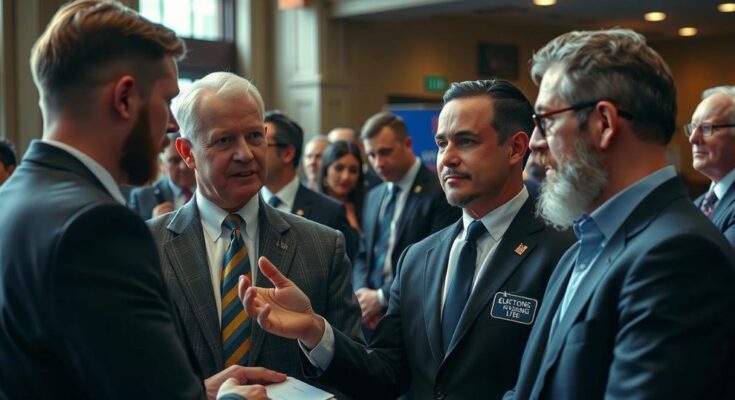Election officials are increasingly confronting misinformation spread by Elon Musk on X, though their efforts often lack the visibility and reach of Musk’s posts. Notable instances include Henrico County registrar Mark Coakley and Michigan Secretary of State Jocelyn Benson, who have made attempts to refute false claims, with mixed success. This situation illustrates broader challenges faced by election officials in combating misinformation and underscores the necessity for credible information dissemination during elections.
Election officials have increasingly found themselves combating misinformation propagated by Elon Musk on his social media platform, X (formerly Twitter). Despite their attempts to counter false claims regarding election integrity, their reach pales in comparison to Musk’s immense following, which exceeds 200 million. In one notable incident, Henrico County registrar Mark Coakley encountered a post by Musk that falsely alleged fraudulent voting activity in his jurisdiction during the 2020 election. Coakley scrambled to respond, but despite a well-crafted rebuttal, the reach of Musk’s claim far surpassed the response’s visibility, a pattern that has been observed repeatedly. The challenge for election officials is not only about addressing the misinformation but also about the distracting and overwhelming burden this places on their responsibilities. Musk’s activity on X has prompted responses from various election officials across the nation. For example, Fulton County Commissioner Seth Bluestein and Maricopa County Recorder Stephen Richer have both attempted to curtail Musk’s spread of misinformation, specifically about election integrity in their regions. Despite their efforts, the disparity in engagement numbers indicates a significant uphill battle when trying to counter disinformation. Furthermore, the assertion made by Musk regarding the number of registered voters in Michigan drew a direct and fact-based rebuttal from Secretary of State Jocelyn Benson, who successfully garnered more views on her response than Musk’s original tweet, highlighting a rare instance of success among election officials opposing misinformation on social media. As election officials grapple with Musk’s influential presence on X, experts have pointed out the corrosive effects of such narratives on democracy and on the administrative duties related to election conduct. The situation underscores the critical need for accurate information dissemination in an era where misinformation can spread rapidly and uncontested. Musk’s lack of response to alarmed election officials further complicates the situation, as engagement and dialogue are pivotal in rectifying misleading narratives. The issue exemplifies the broader challenges stakeholders face as they navigate the intersection of technology, communication, and electoral integrity.
The proliferation of misinformation on social media has emerged as a pressing concern, particularly around the time of elections. Defining accurate electoral information is crucial for maintaining public trust and the legitimacy of the electoral process. The case of Elon Musk’s activity on X is illustrative of how influential figures can leverage their platforms to disseminate potentially harmful inaccuracies, necessitating swift and credible responses from election officials. As misinformation spreads rapidly, the disparity in audience reach poses significant challenges for those aiming to uphold fact-based discourse in political contexts.
In conclusion, while election officials endeavor to counter misinformation propagated by influential figures like Elon Musk, they face formidable challenges due to unequal reach and engagement levels. The discrepancies in visibility of official responses versus misleading claims highlight the urgent need for more effective strategies to manage misinformation. The ongoing struggle underscores the importance of reinforcing the integrity of electoral systems, which is essential for sustaining democratic processes and public trust.
Original Source: abcnews.go.com




